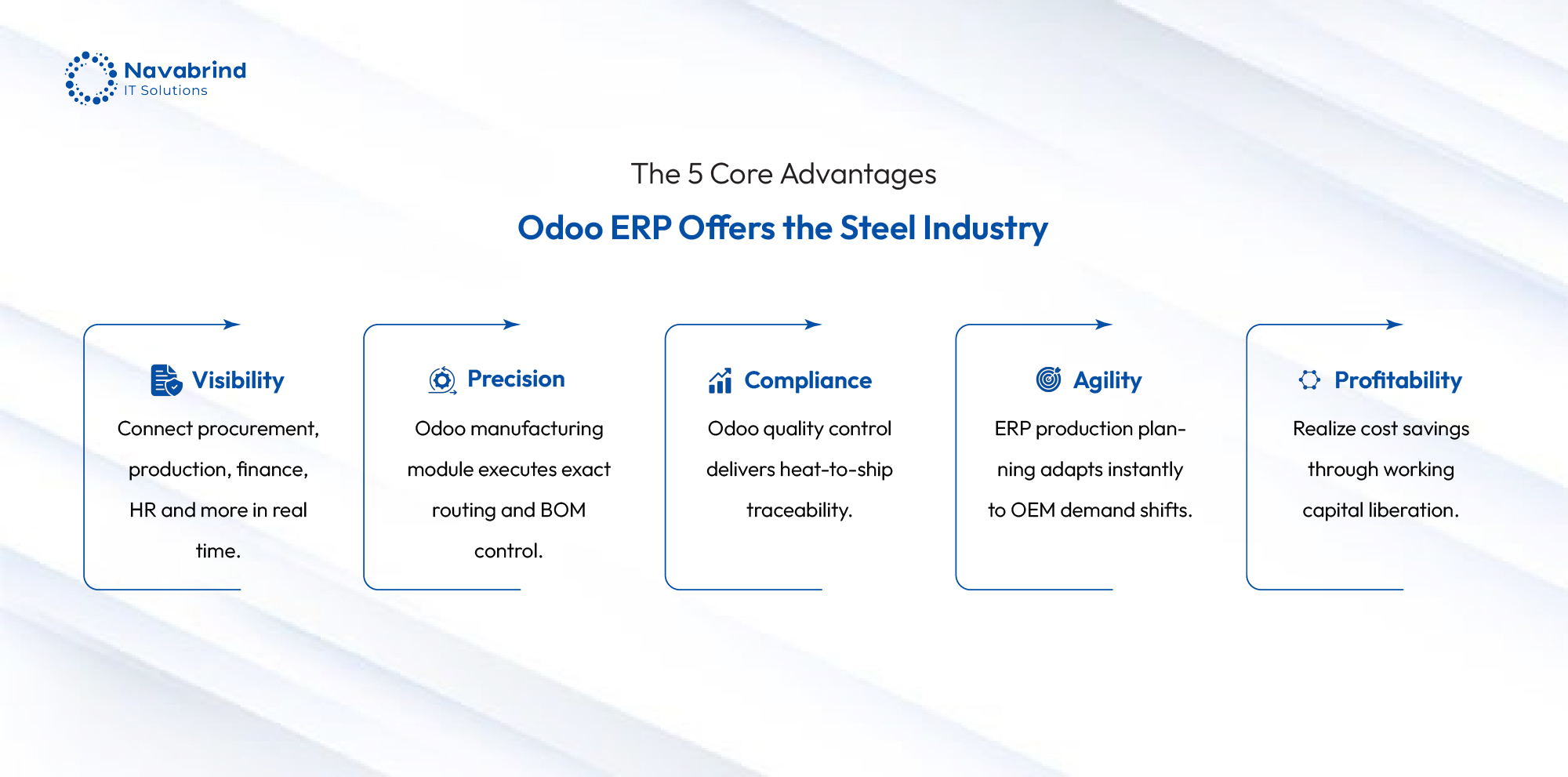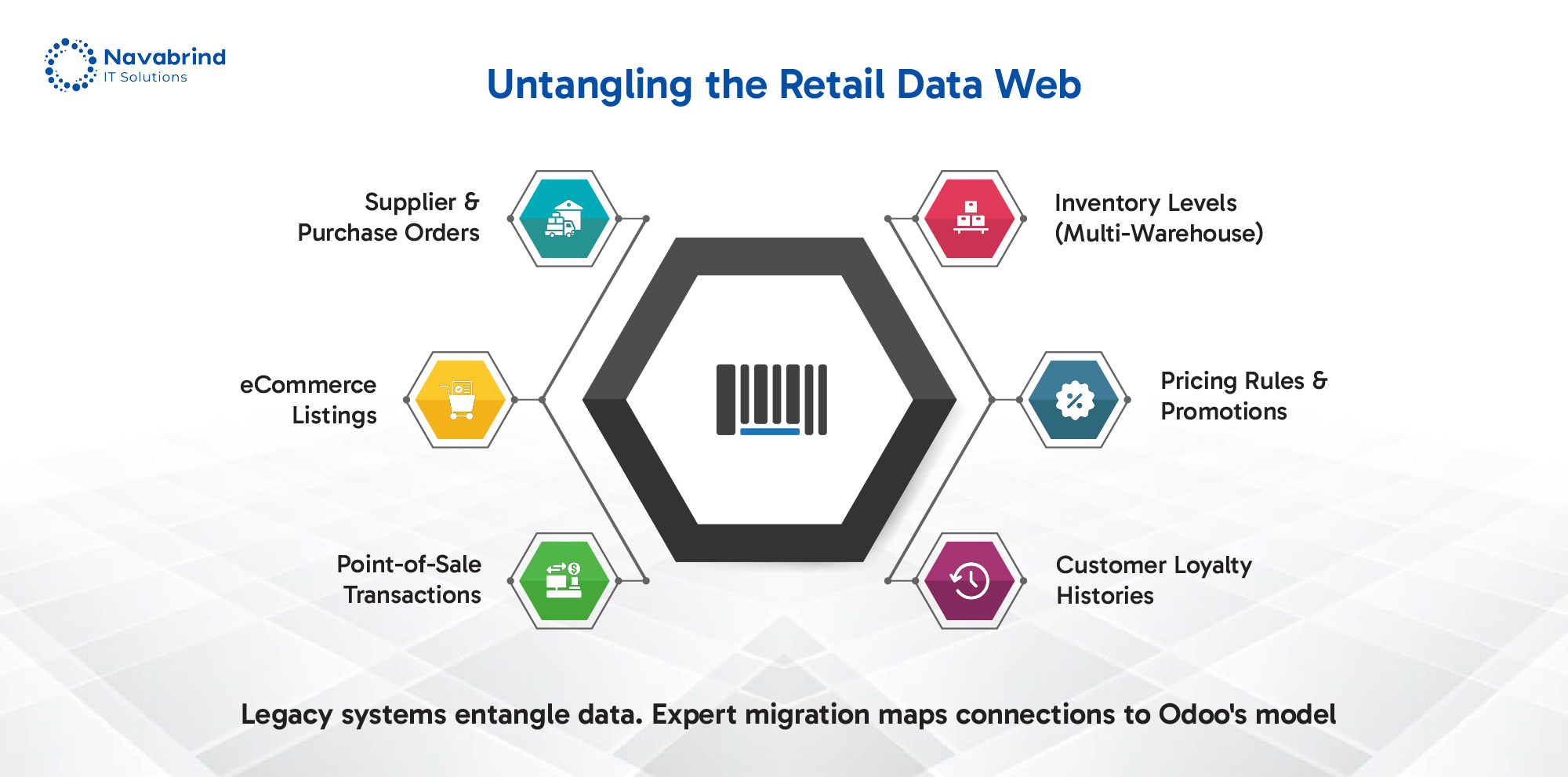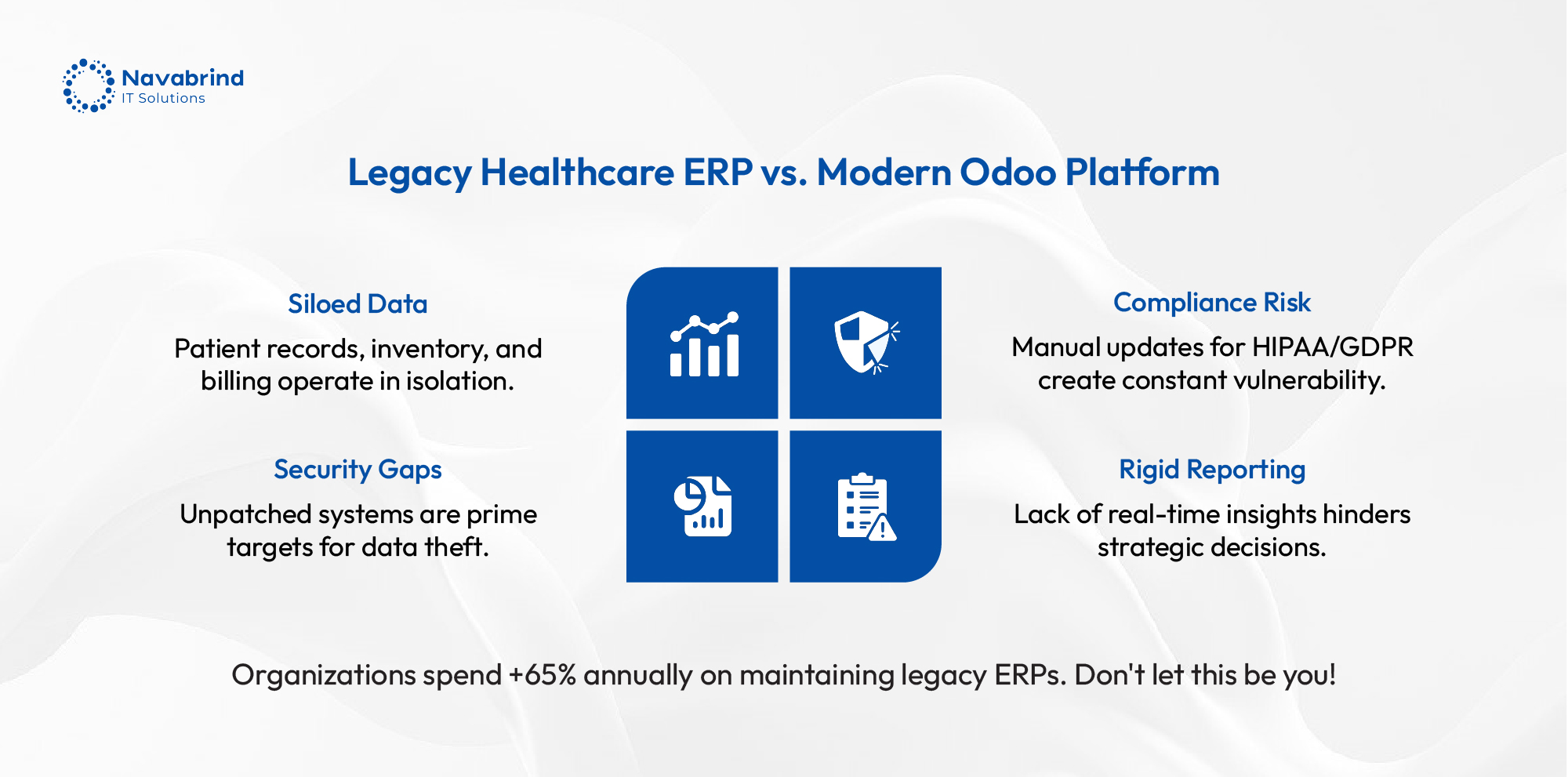Why Odoo is a Game Changer for Distribution Companies
- June 27, 2025
- Posted by: Jaishree Jayabal Singh
- Categories: Blog, Odoo for Distribution industry
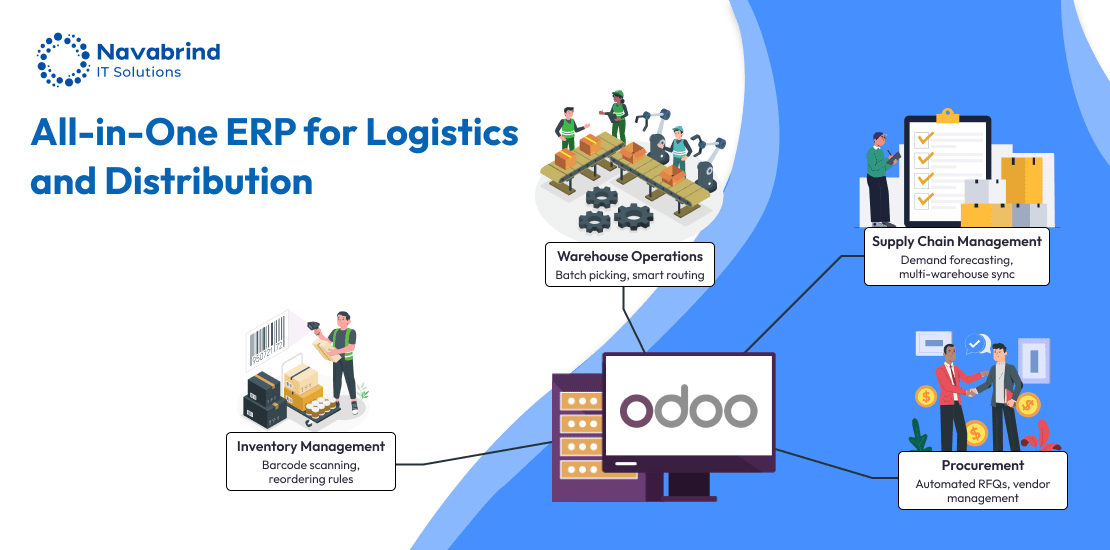
Distribution companies today operate in an increasingly complex and competitive landscape. They face growing pressure to manage rising customer expectations, complex inventory needs, supply chain disruptions, and multi-channel order fulfillment—all while keeping operational costs under control. Traditional systems and siloed software often fall short in delivering the real-time visibility and automation that modern distribution operations demand.
In this environment, adopting a technology-first approach is no longer optional—it’s essential. Companies need robust, scalable, and flexible distribution ERP software that can integrate and streamline their end-to-end operations. This is where Odoo for distribution companies becomes a game changer. Offering an all-in-one platform, Odoo ERP for wholesale and distribution unifies processes like inventory management, order fulfillment, procurement, warehouse control, and customer service under one digital roof.
Whether you’re a regional wholesaler or a global logistics provider, Odoo ERP implementation equips your organization with the tools required for modern Odoo supply chain management, agile decision-making, and superior delivery performance. With advanced features like real-time tracking, automated replenishment, and smart warehouse operations, Odoo inventory and warehouse solutions stand out as among the best ERP for global distribution and inventory management. For growing distribution businesses, Odoo offers unmatched scalability and customization—making it a preferred choice for companies seeking to streamline operations, reduce delays, and increase profit margins. Backed by an experienced Odoo partner for the distribution industry, this powerful platform ensures your ERP journey is efficient, cost-effective, and future-ready.
Industry Pain Points in Distribution
Distribution companies, whether operating locally or on a global scale, are under constant pressure to deliver faster, cheaper, and more accurately than ever before. Yet many still rely on manual processes and fragmented systems, which hinder operational efficiency. From disjointed order management and inaccurate inventory tracking to delayed deliveries and poor demand forecasting, these inefficiencies prevent businesses from scaling. For companies still using outdated tools or multiple disconnected platforms, the lack of a centralized system leads to critical blind spots in data, process delays, and customer dissatisfaction.
The increasing complexity of global supply chains further intensifies these challenges. Distributors must now navigate multi-location warehouses, cross-border logistics, volatile demand, and fluctuating supplier reliability. In such a dynamic environment, real-time coordination is essential. However, many traditional distribution ERP software solutions fail to offer the agility and integrated visibility that modern operations require. This gap creates a pressing need for a unified, end-to-end system like Odoo ERP for wholesale and distribution, which can seamlessly manage the entire distribution lifecycle—from procurement and inventory to shipping and invoicing.
The need for real-time visibility and responsiveness is no longer optional—it’s a competitive necessity. Odoo for distribution companies addresses this by consolidating data and automating workflows, enabling faster decision-making and improved service levels. Through modules designed specifically for Odoo supply chain management and Odoo inventory and warehouse solutions, businesses can accurately track stock across locations, automate replenishment, and respond instantly to demand fluctuations. With the backing of an experienced Odoo partner for the distribution industry, organizations can adopt the best ERP for global distribution and inventory management, benefiting from lower operational costs, improved order accuracy, and higher customer satisfaction. Odoo ERP implementation offers the strategic edge needed for growing distribution businesses to thrive in an increasingly complex market.
Why Choose Odoo ERP for Wholesale and Distribution
Traditional ERP systems often fall short in providing the flexibility, scalability, and integration that modern distribution businesses demand. This is where Odoo ERP for wholesale and distribution emerges as a game changer.
Modular Structure Ideal for Dynamic Distribution Needs
One of the defining advantages of Odoo for distribution companies is its modular architecture. Unlike monolithic ERP systems that require complete overhauls to add new functionality, Odoo offers a suite of interconnected modules that can be implemented incrementally. This allows wholesale and distribution businesses to tailor their Odoo ERP implementation to their unique needs, whether they’re a small regional distributor or a large-scale global wholesaler.
Odoo’s modular structure covers all critical areas of distribution management, including sales, procurement, inventory, warehouse management, accounting, and CRM. Companies can start with the essential modules and add advanced features like demand forecasting, barcode scanning, delivery scheduling, or multi-currency accounting as they grow. This makes Odoo scalable and adaptable, ensuring that the system evolves in tandem with the business.
Real-Time Dashboards and Multi-Warehouse Tracking
Visibility is a cornerstone of effective distribution. Odoo’s real-time dashboards provide actionable insights into every stage of the supply chain. From inventory levels and delivery schedules to sales performance and financial health, decision-makers can access up-to-date data that helps drive operational efficiency and strategic planning.
With robust support for multi-warehouse tracking, Odoo ensures centralized control over geographically dispersed stock locations. Whether you’re managing a single warehouse or a complex network across states or countries, Odoo allows seamless stock transfers, dynamic replenishment, and centralized order fulfillment. This feature is especially beneficial for companies aiming to become the best ERP for global distribution and inventory management.
Demand Forecasting and Procurement Optimization
Odoo supply chain management integrates sophisticated demand forecasting tools that help distribution businesses avoid stockouts and overstocking. Based on historical sales data, market trends, and seasonality, the system generates intelligent procurement suggestions that align with real-world demand. This capability significantly reduces waste, improves cash flow, and enhances customer satisfaction.
Odoo also enables the automation of purchase orders through predefined reordering rules, lead times, and supplier minimums. Integration with supplier portals and price lists ensures streamlined procurement, better negotiation, and vendor performance tracking. For any distribution company looking to gain a competitive edge, this level of automation and intelligence is indispensable.
Integration with Sales, Purchases, and Customer Service
Unlike siloed systems that hinder collaboration between departments, Odoo offers smooth integration across all business functions. From sales and purchase management to customer service and after-sales support, every team operates on the same data backbone. This ensures consistent information flow, reduces errors, and enables quick issue resolution.
For instance, a customer service team can access real-time inventory data to inform clients about product availability, expected delivery times, or status updates. The sales team benefits from automatic pricing rules, promotions, and contract management, while purchase managers get instant visibility into stock levels and vendor performance. This level of cross-functional collaboration directly contributes to better customer experiences and faster order fulfillment.
Benefits of Using Odoo for Warehouse and Logistics Companies
Distribution businesses face relentless pressure to deliver faster and more cost-effectively. Odoo responds to this challenge with comprehensive Odoo inventory and warehouse solutions that include features such as:
- Smart double-entry inventory system
- Batch and serial number tracking
- Route-based logistics
- Automated replenishment
- Real-time stock valuations
Odoo supports integration with third-party logistics (3PL), shipping carriers, and eCommerce platforms, making it a strong contender among ERP for logistics and distribution businesses. As a result, distribution companies can offer shorter lead times, reduce shipping errors, and lower fulfillment costs while maintaining accuracy.
A Cost-Effective and Scalable ERP Solution
A compelling reason to choose Odoo is its affordability. Many Odoo ERP solutions for growing distribution businesses offer enterprise-grade capabilities at a fraction of the cost of traditional ERP systems like SAP or Oracle. The open-source nature of Odoo also reduces licensing fees, while its web-based architecture lowers infrastructure expenses.
Odoo ERP implementation can be phased based on business priorities, helping companies avoid large upfront investments. Whether you’re a growing distributor looking to digitize your operations or a large player aiming to consolidate multiple systems, Odoo offers unmatched flexibility, affordability, and value.
Choosing the Right Odoo Partner for Distribution Industry
The success of any ERP system hinges on effective implementation. Partnering with a trusted Odoo partner for the distribution industry ensures that the system is configured, customized, and integrated in alignment with your unique workflows. Experienced Odoo consultants USA understand the nuances of distribution and can accelerate go-live through pre-configured templates and proven Odoo project methodology.
From mapping Odoo implementation steps for distribution to providing post-deployment support, a qualified partner ensures minimal disruption and maximum ROI. For distribution companies in the U.S. seeking end-to-end digital transformation, Odoo ERP USA backed by a skilled partner offers a powerful foundation for long-term success.
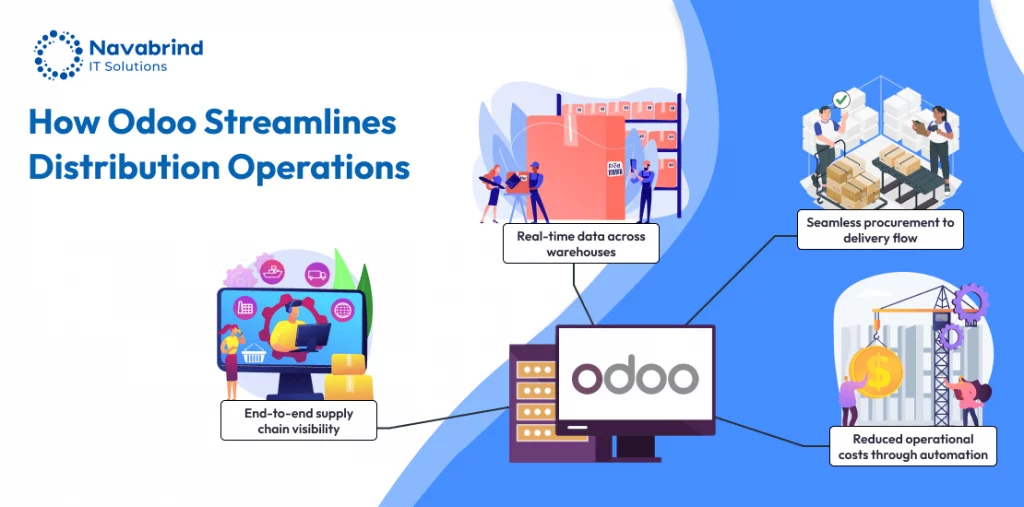
Core Features of Odoo That Support Distribution
Odoo for distribution companies offers a comprehensive suite of modules and features that tackle the complex challenges faced in managing inventory, warehousing, logistics, and procurement. As a modern, modular, and open-source distribution ERP software, Odoo ERP for wholesale and distribution delivers an integrated solution that not only streamlines operations but also provides real-time visibility across the supply chain. For growing and global distribution businesses, leveraging these core capabilities enables better planning, reduces costs, and improves overall customer service.
Inventory Management: Real-Time Control and Automation
Inventory is the backbone of any distribution business, and Odoo’s inventory management capabilities are designed to provide accuracy, speed, and automation. With advanced features such as barcode scanning, automated reordering rules, and real-time stock level tracking, Odoo ensures minimal manual intervention and maximum efficiency. Companies can set replenishment rules based on stock levels, forecasted demand, or lead times, thereby preventing stock outs or overstocking. Barcode integration facilitates faster goods movement, inventory adjustments, and cycle counts with reduced human error.
Another critical advantage of Odoo inventory and warehouse solutions is its support for multi-location and multi-warehouse management. This is especially important for companies with complex storage networks and fulfillment centers. Odoo provides centralized visibility of inventory across all locations, ensuring that distribution companies can fulfill orders from the most efficient location. The inventory dashboard offers real-time reporting and KPIs, enabling better decisions and proactive supply chain management.
Warehouse Management: Smarter, Faster Fulfillment
Odoo ERP for wholesale and distribution includes an advanced Warehouse Management System (WMS) that is built to handle high-volume, high-velocity operations. Features such as batch picking, wave picking, and smart routing optimize the flow of goods within the warehouse. Odoo’s warehouse capabilities allow companies to group similar orders, assign them to the nearest picker, and reduce walking time—all of which significantly improve fulfillment rates and reduce labor costs.
The cross-docking feature is another powerful functionality within Odoo supply chain management. It enables businesses to transfer goods directly from inbound to outbound shipments with minimal handling and storage. This is particularly beneficial for fast-moving goods or perishable items, where speed is critical. Odoo’s WMS integrates seamlessly with other modules like inventory, procurement, and logistics, ensuring end-to-end alignment of warehouse processes with the broader supply chain.
Logistics: Carrier Integration and Delivery Optimization
Efficient logistics and distribution are essential for timely delivery and customer satisfaction. Odoo ERP implementation includes logistics functionalities that simplify carrier selection, shipping rate comparison, and label printing. Odoo integrates with major shipping carriers such as UPS, FedEx, DHL, and USPS, allowing users to access real-time tracking information and delivery updates within the system. With shipment tracking and digital proof of delivery, customers are always informed, enhancing transparency and trust.
Odoo ERP for logistics and distribution provides tools for delivery scheduling, route optimization, and fleet management. The platform supports third-party logistics (3PL) providers and can be configured for drop-shipping or direct-to-customer models. With built-in dashboards and analytics, logistics managers can monitor performance metrics such as on-time delivery rates, shipping costs, and carrier efficiency. These insights empower businesses to continually refine their logistics strategy.
Procurement: Automated Purchasing and Vendor Management
Procurement is another vital area where Odoo ERP helps distribution companies streamline operations. Odoo’s purchasing module offers complete automation of the procure-to-pay cycle. Companies can configure RFQs (Request for Quotations), compare vendor prices, and generate purchase orders automatically based on reordering rules or MRP (Material Requirements Planning) triggers. This ensures that inventory levels are replenished without manual intervention, supporting uninterrupted operations.
Vendor management in Odoo includes supplier price lists, lead times, performance evaluations, and automated communication. The system also supports multiple vendor agreements and dynamic price negotiations based on volume or contract terms. These capabilities are particularly useful for distribution businesses that rely on diverse supplier networks and need to maintain consistent quality and availability.
Through procurement integration with inventory and accounting, Odoo ERP implementation ensures that every purchase transaction is reflected across the system, reducing the chances of discrepancies and enabling end-to-end traceability. This tight integration is crucial for audit readiness and compliance.
Unified Platform with End-to-End Visibility
What sets Odoo apart from other distribution ERP software is its fully integrated, modular structure. All core operations—inventory, warehousing, logistics, procurement, sales, accounting, and CRM—work together seamlessly within one platform. This provides distribution businesses with complete visibility across departments, eliminates data silos, and supports real-time decision-making.
By adopting Odoo ERP solutions for growing distribution businesses, companies can benefit from accelerated digital transformation. They can start with the modules they need and scale up as they grow. Odoo ERP for wholesale and distribution is also cloud-ready and mobile-friendly, enabling remote access and operational agility.
Odoo consultants USA and Odoo partners for the distribution industry bring industry-specific expertise to help configure and customize the solution to meet unique business needs. With a proven Odoo project methodology and deep understanding of Odoo ERP features for distribution, they enable smooth deployment and faster time to value.
How Odoo Streamlines Operations for Distribution Companies
Companies must manage complex supply chains, fluctuating inventory levels, high-volume orders, and logistics coordination—all while maintaining profitability. This is where Odoo ERP for wholesale and distribution proves to be a game changer. With its integrated architecture and modular flexibility, Odoo for distribution companies offers end-to-end visibility and automation across procurement, inventory, warehousing, logistics, and customer service.
A significant advantage of Odoo ERP implementation in the distribution industry is its ability to offer end-to-end supply chain visibility. Every stakeholder—procurement officers, warehouse managers, delivery coordinators, and sales executives—can access a unified dashboard that reflects real-time data. Through its Odoo supply chain management capabilities, businesses can track the movement of goods from vendor to customer with full transparency. For example, sales orders automatically generate purchase and delivery workflows, ensuring seamless coordination across departments. This reduces manual hand-offs, minimizes errors, and speeds up fulfillment cycles.
Distribution ERP software powered by Odoo also enables automation of routine processes, which significantly reduces operational costs. Automated replenishment using reordering rules ensures that warehouses are never under- or over-stocked. Batch picking, barcode scanning, and smart routing optimize warehouse productivity. Integration with shipping carriers allows for automated label generation, shipment tracking, and delivery scheduling—dramatically improving ERP for logistics and distribution. By reducing manual data entry and repetitive administrative tasks, Odoo ERP solutions for growing distribution businesses allow staff to focus on strategic and customer-centric activities.
The smooth flow from procurement to delivery is another critical area where Odoo delivers substantial value. The procurement module integrates closely with inventory and sales, automating the creation of Requests for Quotation (RFQs) based on stock levels and demand forecasts. Once a purchase order is confirmed, the system updates inventory and notifies the warehouse for receiving and inspection. All of this is tightly interwoven with logistics modules, ensuring that goods are dispatched efficiently and customers receive timely notifications.
Odoo supports multi-warehouse and multi-location management, ideal for businesses that operate on a regional or global scale. Features such as cross-docking, drop-shipping, and third-party logistics (3PL) integration are natively supported. These capabilities make Odoo the best ERP for global distribution and inventory management, as companies can manage complex distribution models from a single platform. Combined with powerful analytics and reporting, business leaders can make informed decisions, optimize inventory turns, and forecast demand more accurately.
Working with the right Odoo partner for the distribution industry ensures the system is customized to the specific needs of wholesale and logistics companies. Whether it’s adapting workflows, integrating third-party systems, or training staff, experienced Odoo consultants tailor the solution for maximum ROI. With a structured Odoo ERP implementation plan and ongoing support, even small and mid-sized enterprises can gain enterprise-grade capabilities at a fraction of the traditional cost.
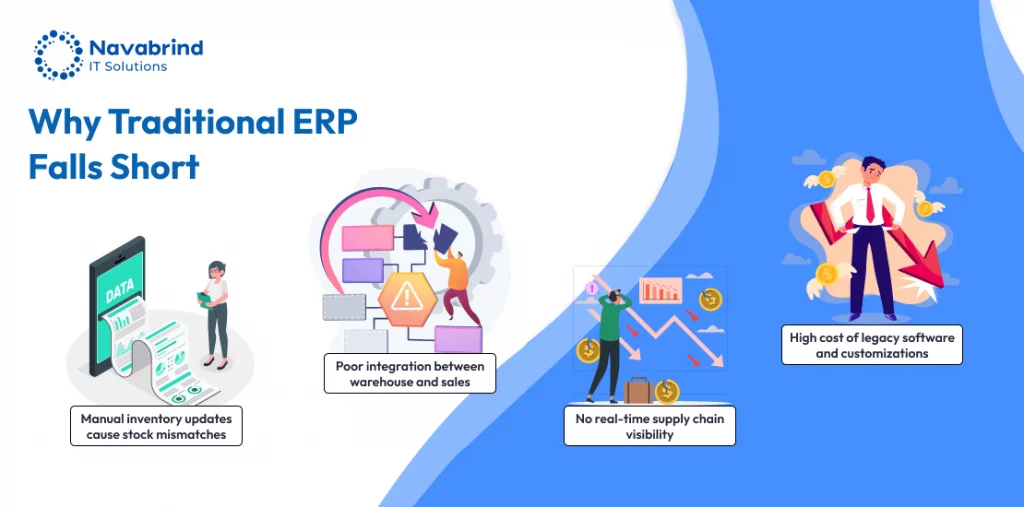
Real-World Benefits of Using Odoo ERP in Distribution
The distribution industry is under increasing pressure to deliver products faster, reduce costs, and maintain high service levels. Meeting these demands requires more than just manual oversight—it calls for a smart, integrated digital backbone. This is where Odoo for distribution companies proves to be transformative. With its unified architecture, real-time capabilities, and modular approach, Odoo ERP for wholesale and distribution delivers measurable, real-world benefits that directly impact business performance.
An immediate gain from Odoo ERP implementation is an increase in order accuracy and on-time delivery. Odoo automates the entire order-to-delivery cycle, minimizing the risk of human error. Sales orders are automatically verified against inventory levels, triggering procurement or warehouse workflows accordingly. Real-time data from the Odoo inventory and warehouse solutions module ensures that picking, packing, and shipping are optimized using barcode scanning, smart routing, and batch processing. These features result in fewer stockouts, fewer mis-shipments, and faster dispatches, giving distribution companies a competitive edge. In an industry where even minor delays can lead to lost business, Odoo enables organizations to consistently meet delivery commitments.
The system also has a direct and positive impact on customer satisfaction, largely through the availability of real-time updates. Through Odoo supply chain management, customers can track their orders from processing to shipment and final delivery. Integration with logistics carriers and real-time dashboards ensure full visibility at every step of the process. This transparency builds trust and reduces customer support inquiries. The CRM and helpdesk modules seamlessly integrate with order and inventory systems, allowing businesses to resolve customer issues swiftly. As a result, benefits of using Odoo for warehousee and logistics companies go beyond internal efficiency—they extend to improved client relationships.
A major advantage is the scalable infrastructure Odoo provides for businesses looking to expand regionally or globally. Traditional ERPs can be rigid and expensive to scale, but Odoo ERP solutions for growing distribution businesses are designed for flexibility. Whether a business operates from one location or many, Odoo supports multi-warehouse, multi-company, and multi-currency environments natively. This makes it the best ERP for global distribution and inventory management, especially for small and mid-sized businesses seeking enterprise-level functionality without the enterprise price tag. As the distribution network grows, new warehouses, suppliers, and customers can be added to the platform without disrupting operations.
Odoo’s modular nature means distribution companies can start small—perhaps with just inventory and sales—and gradually implement additional modules like procurement, logistics, or CRM as needed. This reduces upfront costs while allowing businesses to scale intelligently. By working with an experienced Odoo partner for the distribution industry, companies can tailor their ERP system to meet their exact needs, integrate with third-party tools, and receive ongoing support for evolving business models.
From streamlined operations to improved customer satisfaction and global scalability, Odoo ERP for wholesale and distribution delivers real-world value. It stands out as a modern distribution ERP software solution that supports fast-paced, complex supply chain environments. For companies that want to remain competitive in an increasingly demanding market, Odoo ERP implementation offers the technological foundation to do just that—intelligently, affordably, and reliably.
Why Work with an Odoo Partner for the Distribution Industry
Selecting the right ERP is a crucial decision for any distribution business, but even more critical is ensuring its proper implementation, customization, and long-term support. Odoo for distribution companies offers a robust, all-in-one solution, but unlocking its full potential requires expert guidance. That’s where working with an Odoo partner like Navabrind IT Solutions becomes invaluable. As a certified Gold partner we bring deep technical expertise, industry-specific knowledge, and a structured methodology to ensure success throughout the ERP journey.
Odoo ERP implementation is not just about installing software—it involves understanding business processes, aligning systems with operational goals, and applying best practices. Odoo partners like Navabrind IT Solutions are trained and certified in the latest Odoo versions, ensuring we implement the solution using the most effective Odoo project methodology. This includes needs assessment, gap analysis, module selection, data migration, testing, and user training. Partners experienced in the distribution ERP software space understand the nuances of procurement, order management, shipping, and inventory reconciliation. Our involvement helps mitigate risks such as scope creep, poor adoption, or data inconsistencies, resulting in a smoother and faster go-live.
Every distribution company operates differently. Some rely heavily on vendor-managed inventory, while others focus on just-in-time delivery or multi-warehouse fulfillment. As a qualified Odoo partner for the distribution industry, Navabrind IT Solutions brings the ability to deliver industry-specific configurations and customizations. For example, implementing advanced features in Odoo inventory and warehouse solutions such as barcode-based stock moves, smart picking, and cross-docking can be tailored to suit the layout and operational rhythm of the business. Similarly, Odoo supply chain management features like real-time procurement tracking or automated purchase orders can be adapted to the distribution model. Partners like Navabrind IT Solutions, also integrate Odoo with third-party logistics (3PL), ecommerce platforms, and shipping carriers, delivering a unified system tailored to each distributor’s needs.
In addition to the technical build-out, post-deployment activities are critical to long-term ERP success. Odoo ERP implementation doesn’t end at launch. Employees must be trained to use the system effectively, and ongoing support is necessary to resolve technical issues, apply upgrades, and scale the system as the business grows. This is especially vital for companies aiming to become regional or global players. A dedicated partner like Navabrind IT Solutions offers post-implementation support and training, ensuring users can maximize system performance and resolve issues quickly. This continuous support helps distribution companies adapt the ERP as they expand—whether that means adding a new warehouse, onboarding a new product line, or moving into a new market.
For growing distribution businesses, working with a trusted partner is a long-term strategic investment. The right Odoo ERP solutions for growing distribution businesses provide the scalability and flexibility to meet evolving needs, but only if implemented and managed correctly. Whether it’s achieving end-to-end visibility through Odoo supply chain management, integrating seamlessly with logistics partners, or driving automation in procurement and delivery, partners enable distributors to focus on their core business while the ERP handles the complexity behind the scenes.
Frequently Asked Questions
1. How Does Odoo ERP Help Distribution Companies Streamline Operations?
Odoo ERP is a transformative solution for distribution companies looking to automate, integrate, and optimize their operations. By consolidating multiple business functions—inventory, warehousing, procurement, logistics, and sales—into a single platform, Odoo for distribution companies significantly reduces manual processes and data silos. This centralization enhances operational efficiency and provides real-time access to business-critical data, which is essential for effective Odoo supply chain management and decision-making.
A powerful benefit of Odoo ERP for wholesale and distribution is its ability to manage multi-warehouse environments through features like real-time inventory tracking, automated reordering rules, and barcode scanning. These Odoo inventory and warehouse solutions eliminate stock discrepancies, reduce carrying costs, and ensure that the right products are available in the right place at the right time. This inventory control directly contributes to a leaner and more responsive supply chain, a key concern for growing distribution businesses.
Odoo’s integrated logistics modules streamline the entire order fulfillment process. From ERP for logistics and distribution to shipment tracking and delivery scheduling, businesses can monitor the movement of goods end-to-end. When paired with smart routing and automated procurement features, Odoo ERP implementation ensures fewer delays, fewer human errors, and greater accuracy in demand forecasting. These advantages highlight how Odoo ERP helps distribution companies streamline operations and adapt to modern, fast-paced market demands.
2. What is the Best ERP for Global Distribution and Inventory Management?
For companies with complex, multi-location supply chains and international logistics needs, Odoo ERP for wholesale and distribution stands out as one of the best ERP for global distribution and inventory management. It offers a modular, flexible architecture that supports multi-currency, multi-language, and multi-warehouse operations—key requirements for global businesses. With Odoo ERP implementation, distribution companies gain real-time visibility across regions, enabling them to respond swiftly to changes in demand, supply disruptions, or logistics bottlenecks.
Unlike traditional distribution ERP software that often requires costly integrations and third-party tools, Odoo delivers a comprehensive, out-of-the-box experience. Its Odoo inventory and warehouse solutions and procurement modules integrate natively with logistics, accounting, and customer service, offering a seamless ecosystem. This level of integration is crucial for businesses that aim to grow globally while maintaining operational control and compliance. The platform also supports advanced features like batch picking, cross-docking, and automated replenishment, making it a robust ERP for logistics and distribution at scale.
Working with an Odoo partner for the distribution industry like Navabrind IT Solutions can further tailor the system to meet specific regional or vertical needs. Custom workflows, vendor portals, and regulatory adaptations can be easily configured—resulting in Odoo ERP solutions for growing distribution businesses that are both scalable and cost-effective. These capabilities, combined with real-time dashboards and robust reporting, clearly demonstrate why Odoo is not only ideal for streamlining day-to-day operations but also the strategic choice for companies looking to lead in the global distribution arena.
3. What are the Benefits of Using Odoo for Warehouse and Logistics Companies
Odoo offers a robust and integrated suite of tools that makes it highly beneficial for warehouse and logistics companies looking to enhance efficiency and reduce operational bottlenecks. With Odoo inventory and warehouse solutions, companies can gain full visibility into stock levels, automate reordering, and implement advanced warehouse strategies like batch picking, cross-docking, and smart routing. These features significantly cut down the manual labor and errors typically associated with warehouse operations, making Odoo for distribution companies an ideal choice for businesses seeking automation and accuracy.
One of the standout benefits of using Odoo for warehouse and logistics companies is the integration of warehouse management with procurement, sales, and shipping modules. This end-to-end synchronization ensures that logistics teams are always in sync with real-time inventory levels, delivery deadlines, and customer expectations. Whether it’s barcode scanning, shipment tracking, or real-time delivery status updates, Odoo ERP implementation ensures that all logistics operations are managed from a centralized, user-friendly platform.
Odoo supply chain management capabilities help logistics companies stay agile and competitive. By providing accurate demand forecasts, supplier performance analytics, and lead time optimization, Odoo empowers businesses to make data-driven decisions. Its open architecture also enables Odoo ERP integration with third-party logistics providers, courier services, and IoT-enabled tracking systems. For companies in the ERP for logistics and distribution space, Odoo delivers measurable improvements in cost control, fulfillment speed, and customer satisfaction—making it a top-tier distribution ERP software for warehouse and logistics enterprises.
4. Is Odoo ERP the Best Solution for Growing Distribution Businesses
For growing distribution companies, scalability, flexibility, and real-time visibility are essential—and this is where Odoo ERP for wholesale and distribution excels. Odoo’s modular approach allows companies to start with the core functionalities they need and expand as their operations grow. Modules for inventory, sales, procurement, CRM, and accounting are fully integrated, allowing for a unified operational view. This flexibility makes Odoo one of the best ERP for global distribution and inventory management, especially for small to mid-sized businesses looking to scale without the complexity of legacy systems.
Odoo ERP implementation enables distribution companies to automate key workflows, reduce manual intervention, and improve decision-making through data analytics. Features like demand forecasting, vendor performance management, and dynamic reordering ensure that supply chain processes run smoothly. With native multi-warehouse support, Odoo is ideal for businesses expanding into new markets or managing complex inventories across multiple locations. These Odoo ERP solutions for growing distribution businesses provide the agility and control needed to stay competitive in today’s fast-paced marketplace.
Working with an Odoo partner for the distribution industry ensures that the ERP is configured to meet the specific needs of each business. From custom workflows to role-based dashboards and localized compliance tools, an experienced partner can help unlock the full potential of Odoo. Because of its open-source foundation and wide developer community, Odoo offers a lower total cost of ownership compared to many legacy systems. For those seeking a future-ready, efficient, and customizable ERP for logistics and distribution, Odoo is a strategic and sustainable choice.
5. What Specific Features Does Odoo Offer for Wholesale and Distribution Businesses?
Odoo offers a rich array of features specifically designed to address the operational complexities of the wholesale and distribution sector. As a comprehensive distribution ERP software, Odoo centralizes multiple functions—inventory, warehouse, logistics, and procurement—within a unified platform. Its inventory management module is equipped with barcode scanning, reordering rules, and real-time stock level monitoring, allowing businesses to minimize stockouts and excess inventory. This makes Odoo for distribution companies a reliable choice for automating repetitive tasks and maintaining inventory accuracy across single or multiple warehouses.
The warehouse management module is another standout component of Odoo ERP for wholesale and distribution. It supports advanced warehouse operations such as batch picking, smart routing, cross-docking, and putaway strategies. These capabilities are critical for streamlining picking and packing processes, particularly for businesses managing high order volumes. Coupled with Odoo inventory and warehouse solutions, distribution companies benefit from improved operational agility and reduced turnaround times. Real-time visibility into inventory movements ensures faster decision-making and optimized warehouse layouts.
Odoo also enhances ERP for logistics and distribution with built-in logistics features like carrier integration, automated shipping label generation, and real-time delivery tracking. Its procurement module facilitates the automation of RFQs, vendor management, and price list synchronization. What sets Odoo apart is its seamless integration between these modules, providing a consistent data flow that eliminates silos and ensures efficient supply chain operations. For companies looking for the best ERP for global distribution and inventory management, Odoo delivers end-to-end functionality tailored for scale and performance.
6. Can Odoo ERP Be Customized for the Unique Needs of Distribution Companies?
Yes, Odoo is highly flexible and can be extensively customized to align with the unique operational needs of distribution businesses. Unlike many off-the-shelf distribution ERP software platforms, Odoo is modular and open-source, allowing businesses to configure only the modules they need while retaining the freedom to customize workflows, user roles, and interfaces. This makes Odoo ERP implementation not just a software deployment but a strategic investment that can evolve with your business. Whether it’s adapting to specific warehousing workflows or syncing with external logistics systems, Odoo provides unmatched adaptability for distribution companies.
Working with an experienced Odoo partner for the distribution industry ensures that your ERP is not only configured correctly but also aligned with best practices in logistics, inventory, and procurement. Partners can tailor the ERP to support unique warehouse layouts, integrate with third-party carriers, or build custom dashboards for supply chain performance monitoring. These configurations support Odoo ERP solutions for growing distribution businesses by reducing manual intervention, improving response times, and enabling data-driven decisions. For businesses operating across regions, multi-language and multi-currency customizations also position Odoo as the best ERP for global distribution and inventory management.
Odoo’s customization capabilities extend to automation workflows that help reduce operational costs and improve consistency. With a tailored solution, distribution companies can automate everything from lead-to-order to procure-to-pay processes, achieving true digital transformation. These capabilities explain how Odoo ERP helps distribution companies streamline operations while offering the benefits of using Odoo for warehouse and logistics companies—namely increased efficiency, accuracy, and scalability. For organizations in the distribution sector seeking long-term value and performance, a customized Odoo ERP platform is a future-ready solution.
7. What Are the Long-Term Benefits of Using Odoo for Warehouse and Logistics Companies?
A key long-term benefit of using Odoo for distribution companies lies in cost efficiency achieved through automation. By digitizing and streamlining critical warehouse and logistics operations, businesses can significantly reduce manual labor, errors, and redundancies. With modules tailored for Odoo inventory and warehouse solutions, processes such as barcode scanning, reordering, batch picking, and delivery routing are automated and optimized. This level of operational efficiency directly translates to reduced overhead costs and improved resource utilization—key outcomes that businesses demand from any robust distribution ERP software.
Another advantage is the improvement in order accuracy and fulfillment timelines. Odoo ERP for wholesale and distribution enables real-time tracking of inventory across multiple warehouses and integrates seamlessly with logistics partners for timely shipping and delivery updates. Features like carrier integration, shipment tracking, and automated documentation reduce delays and ensure that customers receive accurate, on-time deliveries. These improvements are not just operational wins—they directly enhance customer satisfaction and brand reputation. For companies focused on scaling operations, these outcomes represent crucial differentiators in a competitive distribution landscape.
Lastly, Odoo ERP solutions for growing distribution businesses offer scalability and flexibility essential for long-term growth. Whether expanding into new regions, launching additional product lines, or onboarding more customers, Odoo’s modular architecture ensures you can adapt your ERP system without a complete overhaul. Integration with finance, sales, CRM, and procurement modules further reinforces its value as an end-to-end ERP for logistics and distribution. When guided by an experienced Odoo partner for the distribution industry, organizations can tailor the system to meet specific compliance standards, language requirements, and market needs. This positions Odoo not only as the best ERP for global distribution and inventory management, but also as a sustainable, future-proof platform that supports continuous innovation and business expansion.
Schedule a conversation with us now!
Related Articles
-
Post
How Odoo ERP Drives Efficiency in the Steel Industry
How Odoo ERP Drives Efficiency in the Steel Industry February 18, 2026 Posted by: Tony Categories: Blog, Odoo No Comments The High-Stakes Race of Auto Parts Manufacturing Your OEM demands a production schedule shift, but procurement can’t confirm steel availability. The sales team lacks real-time inventory data for a quote and your shop floor operates -
Post
Odoo Database Migration Guide: From Homegrown Retail ERP to Odoo ERP Without Downtime
Odoo Database Migration Guide: From Homegrown Retail ERP to Odoo ERP Without Downtime February 18, 2026 Posted by: Tony Category: Uncategorized No Comments The Need for Smooth Odoo Database Migration If your outdated software, disparate applications, and an unsupported ERP begin to hinder work, you are no longer dealing with a minor technical issue, but -
Post
From Legacy Healthcare ERP to Odoo ERP: Why You Need Expert Odoo Migration Help
From Legacy Healthcare ERP to Odoo ERP: Why You Need Expert Odoo Migration Help February 11, 2026 Posted by: Tony Category: Uncategorized No Comments Why Healthcare Organizations Need Odoo ERP Migration Legacy healthcare ERP systems create barriers to efficiency. They are expensive to maintain, and struggle to integrate tools. This disconnect impacts patient care coordination,
How can we help you?
Get in touch with a solutions consultant that can share best practices and help solve specific challenges.







